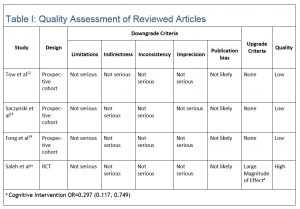The Impact of Cognitive Reserve on Postoperative Cognitive Disorders
Abstract
Background: Postoperative delirium and postoperative cognitive dysfunction (POCD) are common and serious complications of surgery. Under the broader category of postoperative cognitive disorders, both conditions are associated with increased morbidity and mortality. Because of this clinical significance, it is essential to assess a patient’s risk of developing a postoperative cognitive disorder prior to an elective surgery. While there is extensive research regarding risk factors for developing these conditions, less is known about protective factors. The purpose of this review is to examine whether cognitive reserve, specifically measured through years of education, occupation, leisure activities, verbal intellect and presurgical interventions, could reduce a patient’s risk for developing postoperative cognitive disorders.
Methods: An exhaustive search of online medical literature was conducted using MEDLINE-PubMed, MEDLINE-Ovid, CINAHL and Web of Science. Keywords included: cognitive reserve, cognitive intervention, postoperative, surgery and delirium. Eligible studies were assessed using the GRADE criteria.
Results: Four studies met eligibility criteria. Three of the studies were prospective observational studies and one study was a randomized controlled trial. Early life indicators of cognitive reserve (such as years of education, occupation, and lifetime leisure activities) have less of an impact on the development of postoperative cognitive disorders compared to late life measures. Verbal intellect, measured by reading tests, was found to have a significant association with lower incidence of delirium in one study, while the effect did not meet significance in other studies. The late life measures that have the largest impact on postoperative cognitive disorders are leisure activities and pre-surgical interventions. Future studies should further examine the efficacy of pre-surgical cognitive interventions with a focus on which patient populations would derive the greatest benefit.
Conclusion: Late life cognitive reserve has a larger impact on decreasing incidence of postoperative delirium compared to early life cognitive reserve. Preoperative cognitive interventions show promising results in decreasing the incidence of POCD. However, current research is not yet sufficient to recommend either informal or formal cognitive interventions prior to elective surgery.
Keywords: Cognitive reserve, delirium, postoperative cognitive dysfunction
(Click on image to enlarge.)
REVIEWED STUDIES:
Saleh AJ, Tang GX, Hadi SM, et al. Preoperative cognitive intervention reduces cognitive dysfunction in elderly patients after gastrointestinal surgery: a randomized controlled trial. Med Sci Monit. 2015;21:798-805.
Tow A, Holtzer R, Wang C, et al. Cognitive Reserve and Postoperative Delirium in Older Adults. J Am Geriatr Soc. 2016;64:1341-1346.
Saczynski JS, Inouye SK, Kosar CM, et al. Cognitive and brain reserve and the risk of postoperative delirium in older patients: analysis of data from a prospective observational study. Lancet Psychiatry. 2014;1:437-443.
Fong TG, Hshieh TT, Wong B, et al. Neuropsychological profiles of an elderly cohort undergoing elective surgery and the relationship between cognitive performance and delirium. J Am Geriatr Soc. 2015;63:977-982.
AUTHORS: Torsten Berg and Erin Hanley are in the Class of 2016 of Pacific University, School of PA Studies.


